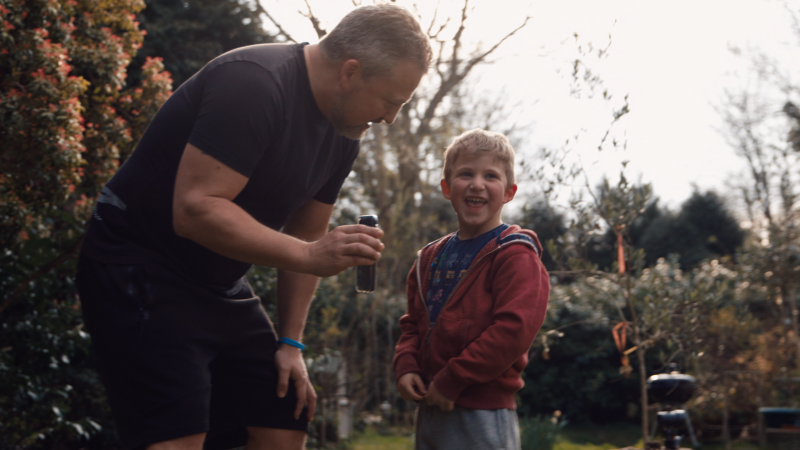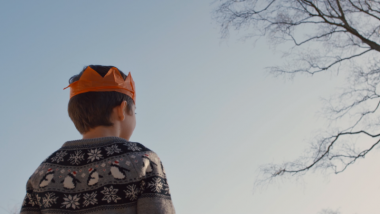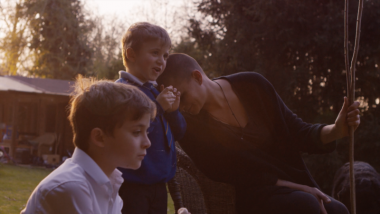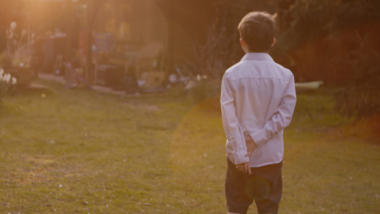‘A Space in Time’ Captures Joys, Struggles of Growing Up With DMD
Written by |

Photos courtesy of Salon
Nick Taussig with his son, Oskar, 7.
“Can some of them get better, Daddy?” a young boy asks his father on the screen.
By “them,” he means people with Duchenne muscular dystrophy (DMD). The boy, Theodor Taussig, who also has DMD, wants to believe he is getting better, and hopes as much as one can that he is, grabbing onto any perceived improvement as a sign.
But the answer is black and white, an impossible pill to swallow, and his father struggles to explain that there is no cure for Duchenne. He’s bracing for life ahead, and how he’ll break that news again and again to Theodor, each time the boy loses muscle function.
DMD is a fatal and progressive muscle-wasting disease. Boys, who are predominantly affected by the genetic disorder, will inevitably stop walking, require 24-hour care, and eventually need ventilators to breathe. Nothing can stop disease’s advance.

The title image of the documentary “A Space in Time.” (Photos courtesy of Salon)
Nick Taussig, a filmmaker and father to Theodor, 10, and Oskar, 7, both with DMD, and Riccardo Servini direct an intimate, open portrait of the joys, sorrows, and family dynamics of living with Duchenne in the documentary “A Space in Time.” The 88-minute film is currently available digitally in North America and premiered in the U.K., where the family lives, on June 25. A virtual screening and Q&A session with the characters and creators of the film is set for July 1.
The film, the winner of the Award of Excellence at this year’s Impact DOCS Awards, tells the story of the two brothers coming of age and of their parents coming to grips with their disease as the couple, with the help of friends, build an extension to their home to provide for their boys’ future needs — accessible toilets and showers, ceiling-mounted lifts, and room for bulky power wheelchairs, among other changes.
“You have ideas for your children and that’s all bullshit because your kids are your kids and they’re their own individuals,” Taussig said in an interview with Muscular Dystrophy News Today. “[DMD] forces you to challenge those ideas. It forces you to challenge what it means as a parent. It forces you to think about what it means to be disabled.”
Taussig, founder and managing director of the film company Salon, which produced the documentary, began filming with his iPhone — before moving to professional cameras — in 2016, two years after his sons were diagnosed with DMD. Salon wrapped up filming in February 2020.
Building an extension to their new country home, some 25 miles outside London, to accommodate Theodor and Oskar’s future needs is part of the documentary. But it’s more than that. Making their home accessible was a conduit through which Taussig and Servini could help the audience understand what having a disability, no matter the type, felt like both for those directly affected and everyone around them.
In a written interview with Muscular Dystrophy News, Oskar and Theodor both agreed that their favorite part of the home was their bedrooms. Taussig, in a different conversation, said that Theodor loves his bed’s ability to raise his head so he can read at night.

Klara Taussig Cecmanova with her sons, Theo, 10, at left, and Oskar, 7.
Moments of heartbreak dot the story, whether it’s Theodor crying when he can’t play football with his able-bodied friends; the openness of Klara Taussig Cecmanova, Taussig’s wife, about her depression; Taussig accepting the difficult future his children will face; or Harrison, another young boy with DMD, wondering if he was the reason his parents split.
But moments of happiness, laughter, and hope abound.
“The non-disabled community still, generally speaking, will define somebody by their disability first and foremost,” Taussig said. “And life is way bigger than that.”
The documentary brings in other characters, including John Rey-Hastie, a 39-year-old who’s among the oldest DMD patients in the U.K.; Alex Smith, who runs the organization Harrison’s Fund, which raises money for DMD research, for his son Harrison, who also appears in the film; and one of the boys’ hospice caregivers.
But the film mainly focuses on Oskar, who has autism and severe developmental delays, taking the disease one day at a time and thus having a different perspective on DMD, and on Theodor, who has a good outlook on life while understanding the nature of the disease.
“Like so many other kids with Duchenne, it’s pretty remarkable because [Theo] is just incredibly accepting of it,” Taussig said. “He’s incredibly pragmatic about it. He just gets on with it.”
Taussig said one of the film’s difficulties was figuring out how to portray Theodor in a way that would not embarrass him as he grew older, while also trying to show the experience of being disabled to the outside world.
“Personal journey documentaries can either become a bit self-indulgent or they can become too personal. What I’ve tried to do throughout is not compromise him,” Taussig said. “We did it as a family. But it’s also trying to validate his experience. Many disabled voices are still marginalized. If the protagonist of any film can be a disabled protagonist, that’s a good thing.”
Part of the documentary is devoted to the social model of disability, which holds that someone’s inability to do an activity others can is not a reflection of that person’s limitations but rather obstacles in the external environment, such as stairs. Society needs to change to equally accommodate all its residents.
While Taussig said the film is for everyone, he hopes it will be watched by parents of children with rare diseases. It undermines the narrative that disability is “victim-led” and makes people feel pity for the person.

Theo Taussig in the yard of his family’s new, disability-accessible home.
“It was about trying to make something which actually almost surprised audiences,” Taussig said. “It didn’t wallow in the tragedy of it all. It presented the hard reality of living with a disease that also said, ‘Look, there’s a whole side to this of what’s possible,’ and we wanted to make something that looked to transcend the difficulties of the disease.”
Taussig hasn’t yet decided if he will do a follow-up documentary. But if Theodor later decides to document his own life with the disease, Taussig would welcome it.
The reality of DMD is not something the Taussig family has shied away from, confronting changes as they come. That feeling is clearly shown throughout the film. Theodor and Oskar have a different future than most, but it doesn’t necessarily have to be a bad one.
“The emphasis we put on things like education is different. We’re more focused on Theo doing as many things as he can do while he can still do them,” Taussig said. “It’s trying to trust him enough to tell us what’s important to him in the context of what his future holds.”






